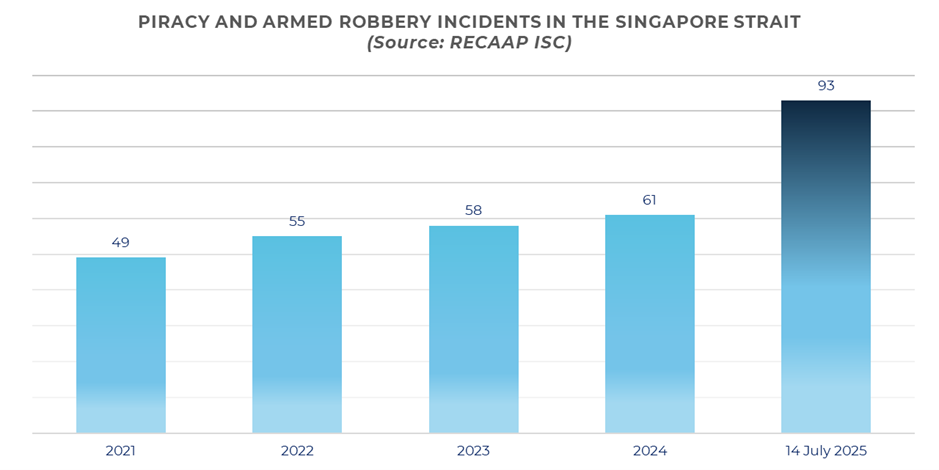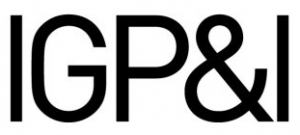
Global piracy and armed robberies are once again on the rise, owing to a surge in incidents in the Singapore Strait. Ships operating in piracy hotspots are advised to remain vigilant, keep a sharp lookout, and adhere to the latest industry best management practice guidelines.
Updated 14 July 2025
Published 04 June 2025
Troubling piracy trends in early 2025
The first six months of 2025 saw a 50% increase in global piracy compared to the same period last year, according to the IMB Piracy Reporting Centre (IMB PRC). The agency also expresses concern for crew well-being, referring to the perpetrators’ continuing use of violence and threats against vessel crew.
The Singapore Strait has emerged as an area of particular concern. Since the beginning of 2025, the Regional Cooperation Agreement on Combating Piracy and Armed Robbery against Ships in Asia Information Sharing Centre (ReCAAP ISC) has recorded 93 incidents in the Strait, the same number as in all of 2024 and a stark increase from the 21 incidents recorded during the same period in 2024.

Most of the incidents occurred at night in the Straits’ eastbound lanes and bulk carriers were the most frequently targeted vessel type. While the incidents were predominantly reported as low-level opportunistic thefts, with little physical injuries to crews, it is not uncommon for the perpetrators to be armed with knives and other weapon-like objects and to threaten the crew.
Concerned with the increase and recurring occurrence of incidents in the Singapore Strait, the ReCAAP ISC has to-date issued six Incident Alerts since the start of 2025, to alert the maritime community and to warn about the possibility of further incidents. Vessels operating in the Strait, particularly those transiting eastbound during the hours of darkness, are advised to intensify vigilance and maintain sharp a look out while transiting the Straits of Malacca and Singapore (SOMS), and to report all incidents immediately to the nearest coastal State, as indicated in its poster: “Guidelines & Reporting of Incidents by Vessels – Straits of Malacca & Singapore”.
New best management practices (BMP)
On 31 March 2025, the Industry Associations of BIMCO, ICS, IMCA, INTERCARGO, INTERTANKO and OCIMF released a consolidated and enhanced publication “BMP Maritime Security” (BMP MS). The new BMP MS consolidates previously published regional BMP documents into a single, comprehensive publication.
The guide offers comprehensive information on maritime security, covering a wide range of important topics. It begins with an overview of maritime security threats, followed by detailed instructions on how to carry out threat and risk assessments. The guide also offers guidance on effective planning, risk mitigation strategies, and incident response procedures. Post-incident protocols are included to ensure proper follow-up actions.
The BMP MS is available at joint industry association website: https://www.maritimeglobalsecurity.org/.
Maritime industry security threat overview (MISTO)
Maritime security threats vary across regions and within them, in terms of their nature and severity. The purpose of the new BMP MS is to help all ships plan their voyage and to detect, avoid, deter, delay and report security incidents wherever they may occur. As a result, instead of providing regionally specialised information and advice, it concentrates on offering a globally applicable threat and risk management process, directing users to outside sources for the most up-to-date security intelligence and risk assessment information.
Along with the new BMP MS, the industry associations therefore released a document compiling general and situational information regarding the maritime domain, the MISTO. It provides an overall understanding of the prevailing security threats, with focus on the physical threats with potential to cause serious harm to people, environment, ship and cargo, such as acts of piracy, armed robbery, terrorism and war/armed conflict.
The MISTO will be updated every 3-6 months depending on the situation, and the 31 March 2025 version covers the following regions:
Gulf of Guinea – predominantly Niger Delta based pirates
Red Sea Gulf of Aden, Northwest Indian Ocean – Houthi insurgents
Northwest Indian Ocean and adjacent waters – Somali pirates
Straits of Malacca and Singapore (SOMS) – pirates and armed robbers
Black Sea and Sea of Azov – Russia and Ukraine
Like the BMP MS, the MISTO is available at the joint industry association website: https://www.maritimeglobalsecurity.org/.
Stay alert and be prepared!
Maritime security threats are dynamic and ever-changing. Different ship types and sizes may need different security procedures and specific trading regions may need special measures to be implemented onboard. For this reason, ship operators and masters must do their best to monitor maritime security threats and incidents in the regions to which their vessels will trade. This includes:
consulting the most recent MISTO,
obtaining updated information from local sources, such as the regional reporting and information centres,
checking the latest NAVAREA warnings and alerts, and
reviewing industry, Flag State, company, and military routing advice.
Relevant mitigating measures must be adopted, following available industry guidance and best management practices, and the crew trained and briefed on the equipment and procedures to be used when operating in a high-risk region. Furthermore, the registration and reporting requirements of Annex A of the BMP MS should be implemented. The potential consequences of not following industry best practices may be severe when operating in regions prone to piracy and armed robbery, or other security threats.
Please refer to Gard’s website “Piracy and armed robbery at sea” for further advice.





